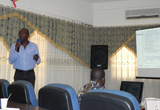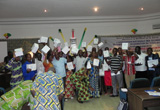 When people talk about the crisis of unsafe anaesthesia worldwide, there’s one particular publication that is frequently referenced—it’s too shocking to ignore.
When people talk about the crisis of unsafe anaesthesia worldwide, there’s one particular publication that is frequently referenced—it’s too shocking to ignore.
“Deaths associated with anaesthesia in Togo, West Africa,” published in Tropical Doctor in 2005, demonstrated that anaesthesia mortality in Togo could be as high as 1:133 patients.
Lifebox recently spoke to lead author Fataou Ouro-Bang’Na about the origins of this paper, the culture of surgical safety, and his role in a recent Lifebox training workshop in the capital city of Lomé.
 The workshop was thanks in great part to the generosity of BMJ readers who supported Lifebox in the journal’s holiday appeal last year. You helped us to donate 113 pulse oximeters and coordinate a workshop on pulse oximetry and the WHO Surgical Safety Checklist for 179 anaesthesia providers from Togo and Benin, in association with the National Association of Anaesthesia Technicians of Togo (ANTART).
The workshop was thanks in great part to the generosity of BMJ readers who supported Lifebox in the journal’s holiday appeal last year. You helped us to donate 113 pulse oximeters and coordinate a workshop on pulse oximetry and the WHO Surgical Safety Checklist for 179 anaesthesia providers from Togo and Benin, in association with the National Association of Anaesthesia Technicians of Togo (ANTART).
Lifebox: Congratulations on such a successful workshop. Are you pleased with how it went?
Fataou: Surely! I’m very happy. We can now say that today, in every operating theatre in Togo, there is a Lifebox pulse oximeter.
Every patient having surgery can be monitored, and this is so important. With a pulse oximeter you can prevent complications—not because anaesthesia providers are not competent, but because the conditions of their practice are not the best.
Lifebox: were there any pulse oximeters in the operating theatres before?
Fataou: Well in Lomé, the capital, you might see one or two. But after a few months, a year, it doesn’t work. It’s not adapted. Mostly we use our finger, or stethoscope, or check the colour of the blood during an operation.
Now we have pulse oximeters that are adapted to the conditions of a hospital in Togo. It’s going to make a very big difference.
Lifebox: your paper on rates of anaesthesia mortality demonstrated that it could be very dangerous for a patient in Togo.
Fataou: That’s really why I chose this specialty when I was in medical school. I could see so many people, when they went for surgery—unfortunately they died. They just died. Even people who were otherwise in good health. The rate of morbidity and mortality was very, very high.
Lifebox: is that why you decided to publish?
Fataou: In Sub-Saharan Africa particularly, there are not many studies. This means that sometimes people don’t know what exactly is happening in their own countries. People asked me, why are you publishing this? Are you sure that it is true? I chose to make it known, not just to anaesthesia providers in Togo, but around the world.
I’m happy about that, because it’s true. And once we have the numbers we can be better at addressing the problem.
Lifebox: Surgical safety may seem like an obvious concept, but it can be difficult to develop as a culture. Why do you think that is?
Fataou: Patient safety is about communication, but I also think it has its own language. If you don’t understand a language then you can’t discuss it with people, and the language of patient safety isn’t a familiar one in Togo and other countries in Sub-Saharan Africa.
This is a challenge we will not finish in a month, or two years. Things have changed, but it’s taking time.
Following the workshop I was so happy, because the discussion had begun. Nurse anaesthetists went away from the workshop feeling like they could begin talking about surgical safety with their team.
Lifebox: What sort of feedback have you had from the nurse anaesthetists who received pulse oximeters?
Fataou: If I were to tell you all their explanations, we wouldn’t finish this conversation today!
People were very, very happy. I realised—and this made me really happy too—that they knew they needed this equipment. They knew it could help them in their practice.
One nurse anaesthetist told me that before he had a pulse oximeter he felt like an airplane pilot without a radar. Now he has an oximeter he has a radar; now he can see where he is going.
Fataou Ouro-Bang’Na is an anaesthetist and assistant professor in anaesthesia at the University of Lomé-Tokoin Teaching Hospital in Togo. He currently works in Guadeloupe.
Lifebox is the BMJ’s holiday charity this year. For more information, or to donate, see this week’s BMJ or visit www.lifebox.org. The BMJ campaign runs until the end of January.
